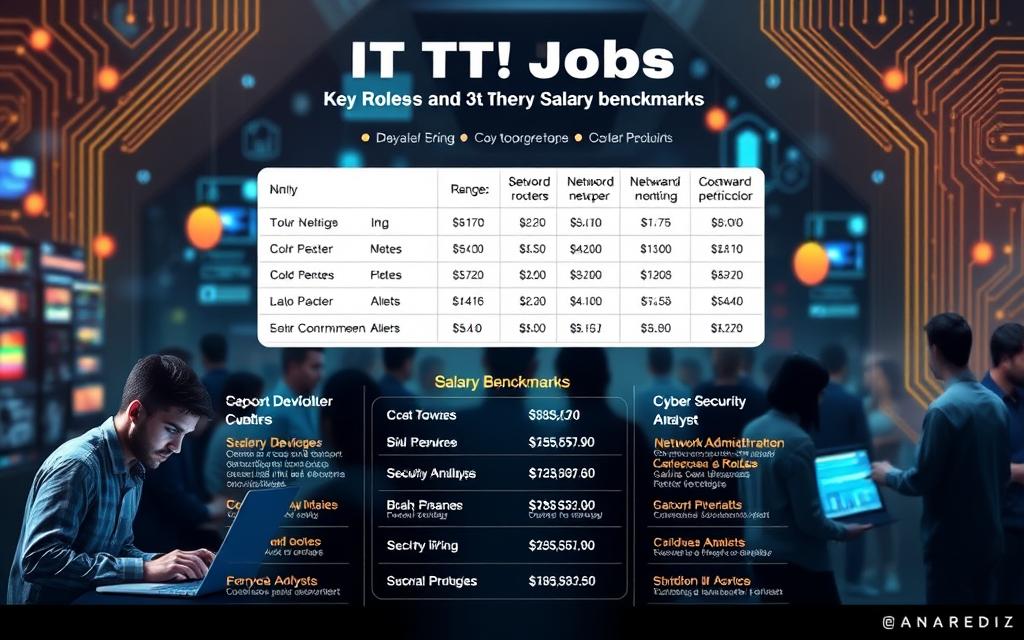Digital transformation is changing the world, and tech jobs are leading the way. Miriam Groom, a top analyst at Tech Futures Institute, says: “IT pros are making big changes in healthcare and work, thanks to AI and remote tools.” This is backed by 72% of US companies focusing on digital upgrades.
IT jobs also come with great pay. The Bureau of Labor Statistics shows IT workers earn 50% more than the average. With 26,000 tech jobs opening every month in the US, the demand is high. Cloud engineering and cybersecurity are in high demand.
Flexibility is a big plus in tech jobs. Now, 68% of tech roles offer hybrid work, unlike old office jobs. This flexibility, along with chances to learn new skills, makes IT jobs “future-proof”.
New areas like quantum computing and ethical AI are opening up more career paths. As companies face data security and automation issues, IT experts are key to solving these problems.
The Current State of IT Careers in 2024
IT careers are key to the world’s economic growth as digital strategies speed up. Three main factors shape this scene: fast tech adoption, changing work places, and big public investments. These changes open new doors for tech experts.
1.1 Digital transformation acceleration across industries
Healthcare and manufacturing are leading the way in IT infrastructure development. Miriam Groom’s study shows the US needs 377,500 new IT jobs every year. This is because companies are using AI for logistics and automated services.
Retailers are spending 34% of their budgets on moving to the cloud. Banks are investing in blockchain. These moves are essential for staying ahead.
“Diverse teams deliver 19% higher innovation revenue,” notes Forbes. This supports Champlain College’s efforts to increase diversity in tech jobs.
1.2 Post-pandemic workforce evolution in tech sectors
Remote work trends have changed how we work. Now, 68% of US tech companies offer flexible work options. Gartner found a 43% productivity increase in teams using tools like Asana and Slack.
But, this shift means we need new skills. These include:
- Cybersecurity for remote networks
- Cloud-based project management
- Cross-border compliance
1.3 Government initiatives boosting IT infrastructure
National plans are boosting tech workforce analysis and creating jobs. The US Infrastructure Act gives $65 billion for broadband and smart grids. Australia’s Smart Cities Plan puts $50 million into IoT.
These efforts lead to jobs in:
- 5G networks
- Public-sector cybersecurity
- Urban digital twins
These investments promise stable careers. The global smart city market is expected to hit $1.7 trillion by 2025.
Growth Projections and Market Demand
IT careers are set for huge growth by 2031. This is thanks to a focus on digital skills in various industries. Cybersecurity, cloud infrastructure, and AI development are leading the charge, each with its own set of opportunities.

Bureau of Labor Statistics Employment Forecasts
The BLS tech projections show IT jobs will grow by 15% by 2031. This is three times faster than the national average. It means 682,800 new jobs will be created, with cybersecurity roles growing the most at 32%.
Software developers are also expected to see a 25% increase in their numbers.
Sector-Specific Growth: Cybersecurity vs Cloud Computing
Cybersecurity is now a top priority for employers due to rising data breaches. These breaches cost companies an average of $4.45 million. Cloud computing, on the other hand, is growing at a steady 25%.
- Security architects in finance can earn over £130,000.
- Cloud engineers see their salaries increase by 18% each year.
Emerging Demand for AI and Machine Learning Specialists
The demand for AI specialists is rising, driven by healthcare diagnostics and fraud detection. Coding Temple says 67% of their Python/JavaScript graduates find AI engineering jobs within six months. Big banks are now spending 40% of their IT budgets on machine learning.
“AI implementation costs have dropped 300% from 2020, making ML skills key for career changes.”
3. Emerging Technologies Shaping IT Careers
The IT world is changing fast with new technologies. Jobs in quantum computing jobs, blockchain careers, and IoT infrastructure roles are becoming more common. These new fields are making big waves in many industries.
3.1 Quantum Computing Development Timelines
Quantum computing is moving from theory to real-world use. It’s expected to become common between 2026 and 2030. This tech can solve complex problems quickly, changing fields like encryption and drug discovery.
Big names like IBM and Google are racing to lead in quantum computing. They need experts in:
- Quantum algorithm development
- Error correction systems
- Hardware-software integration
Champlain College now teaches quantum computing in its data management courses. Research shows these jobs can pay up to $127k, making them attractive for tech experts.
3.2 Blockchain Applications Beyond Cryptocurrency
Blockchain is more than just for digital money. It’s used in supply chains, healthcare, and voting systems. For example, Walmart uses it to track food from farms to stores, cutting down on fraud.
Jobs in this area include:
- Smart contract developers
- Blockchain security auditors
- DeFi (Decentralised Finance) architects
These roles need skills in cryptography and distributed systems. Tech hubs like Silicon Valley and Austin are looking for these experts.
3.3 IoT Expansion in Smart Cities Infrastructure
Forbes has shown how IoT is changing cities. Barcelona and Singapore are using sensors to manage waste and traffic. This improves energy use and safety.
IoT jobs are growing fast. Key areas include:
- Edge computing integration
- Network security for connected devices
- Data analytics platforms
With 75 billion devices expected by 2025, cities need experts. These jobs combine hardware and data science, paying well in the US.
4. Key IT Job Roles and Salary Benchmarks
Exploring core positions in information technology reveals lucrative opportunities for professionals with the right expertise. Let’s examine high-demand roles across software development and cybersecurity, along with their earning potentials in today’s market.

Software Development Positions
Full-stack developer requirements combine front-end and back-end competencies. Employers typically seek proficiency in Python or Java alongside frameworks like React or Angular. According to Miriam Groom’s industry analysis, these versatile professionals command median salaries of $120,000 (£95,000) in the United States.
Mobile App Development Specialisations
iOS and Android developers specialising in Swift or Kotlin see strong demand. Entry-level positions start at $83,000 (£66,000), while senior developers earn upwards of $145,000 (£115,000). The mobile sector rewards professionals who master platform-specific optimisation techniques and cross-platform tools like Flutter.
Cybersecurity Career Pathways
With cyber threats increasing by 38% annually (BLS), security experts enjoy exceptional job security. Ethical hacker certifications serve as critical entry points, including:
- Certified Ethical Hacker (CEH)
- CompTIA Security+
- Offensive Security Certified Professional (OSCP)
Security Architecture Roles
Experienced professionals with CISSP certifications frequently transition into security architect positions. These roles average $130,000 (£103,000) annually, requiring expertise in network design and threat modelling. Senior positions often involve developing enterprise-level security frameworks for Fortune 500 companies.
“Certifications remain the golden ticket for cybersecurity advancement – they demonstrate practical skills better than degrees alone in many cases.”
The table below illustrates salary progression in key IT roles:
| Position | Entry-Level | Mid-Career | Senior |
|---|---|---|---|
| Full-Stack Developer | $85k | $112k | $148k |
| Mobile Developer | $83k | $105k | $145k |
| Security Architect | $98k | $125k | $163k |
5. Required Skills and Qualifications
To succeed in IT in 2024, you need a mix of technical skills and soft abilities. Employers look for people who know the latest tech and can adapt quickly. Let’s explore what’s needed for a successful tech career.
5.1 Technical Competencies for Modern IT Professionals
Cloud computing skills are key in 2024, with AWS and Azure being essential. Coding Temple’s bootcamps focus on these, with 40% of the course on cloud platforms. Knowing SQL and NoSQL, and being proficient in Python and JavaScript, is also vital.
There are also special areas that need specific skills:
- Cybersecurity: Learning about threats and ethical hacking
- AI development: Understanding neural networks and machine learning
- DevOps: Working with CI/CD pipelines
5.2 Soft Skills Prioritised by Tech Employers
Knowing tech is not enough. A LinkedIn survey found 72% of IT managers value communication skills as much as coding. Important soft skills include:
- Working well with others in Agile teams
- Being client-focused in problem-solving
- Adjusting to remote or hybrid work
Scrum project management needs emotional intelligence as well as technical skills.
5.3 Degree Alternatives: Bootcamps vs Certifications
Four-year degrees are not the only option. Focused training like Champlain College’s six-month certificates can fill skill gaps. Here are some alternatives:
| Pathway | Duration | Cost Range | Ideal For |
|---|---|---|---|
| Coding Bootcamps | 12-24 weeks | $8,000-$21,000 | Career switchers needing hands-on practice |
| Professional Certifications | 3-6 months | $300-$800 | Experienced professionals specialising further |
CompTIA Security+ and CISSP are as valuable as degrees in cybersecurity. AWS-certified solutions architects earn salaries similar to university graduates.
6. Challenges and Considerations in IT Careers
Starting an IT career today comes with big challenges. You need to keep up with fast tech changes and look after your wellbeing. You also have to get used to new ways of working. Let’s look at three key things that shape tech careers today.

6.1 Continuous Learning Requirements
The IT world needs you to learn new things every year. Miriam Groom found that you need to upskill by 6% each year. This means:
- 120+ hours of training yearly for AI integration roles
- Certification renewals every 18-24 months
- Weekly time investment in new programming frameworks
New tools like generative AI need you to learn skills that didn’t exist before. This makes work exciting, but 68% of tech workers feel tired from learning too much.
6.2 Work-Life Balance in Tech Roles
Working from home can be good and bad. Gartner found that:
“43% productivity improvements occur when teams control their schedules.”
But, working all the time can make it hard to separate work and life. Tech workers do 5.8 hours of unpaid overtime each week. Cybersecurity experts are the most burnt out, at 34%.
6.3 Outsourcing Risks and Global Competition
Outsourcing in IT has gone up by 22% in two years. This makes things complicated:
| Factor | In-House Roles | Outsourced Positions |
|---|---|---|
| Average Salary | $98,000 | $62,000 |
| Project Flexibility | High | Limited |
| Skill Specialisation | Broad | Niche |
Freelance sites now connect US developers with people all over the world. This makes it harder to get into the job market. But, you can stand out by becoming an expert in something like quantum-safe cryptography.
7. Career Advancement Opportunities
The world of information technology is always changing. This means there are many ways for people to grow in their careers. With 72% of tech companies now focusing on promoting from within, planning your career is key to moving up.

7.1 Leadership Pathways in Tech Organisations
To get ahead in IT, you need to be good at both tech and business. Roles like CTO or CIO require:
- Project Management Professional (PMP) certification
- MBA qualifications focusing on technology management
- Proven experience in working across different departments
IT managers in the US make an average of $164,000. Those who switch roles every year can earn 12.2% more (Champlain College).
7.2 Entrepreneurship in IT Sectors
The SaaS market is expected to hit $1.2 trillion by 2024. This opens doors for innovative startups. Successful tech entrepreneurs often:
- Find unique needs in growing markets
- Use cloud services to save on costs
- Apply AI analytics for better market positioning
7.3 Global Mobility and Remote Work Options
Now, 46 countries offer digital nomad visas for remote tech jobs. These visas come with tax benefits. Important things to consider include:
- Managing time zones for teams spread out worldwide
- Ensuring strong cybersecurity for global operations
- Adapting to different cultures for clients
This flexibility lets you grow your career while enjoying your life. You can also earn salaries based on international standards.
Is Information Technology Good for Your Future?
The IT career outlook for 2024 looks bright. The Bureau of Labor Statistics predicts 377,500 new jobs each year. Specialisations like cybersecurity can earn you more than 50% above the average salary.
AI, quantum computing, and IoT are changing the game. They’re making IT a key player in innovation worldwide.
But, choosing an IT career needs careful thought. You must keep learning new skills. Sites like Coursera and Udacity help with that.
Employers like Google and Microsoft want people with both tech skills and teamwork abilities. They look for those with AWS Cloud Practitioner certifications and good problem-solving skills.
IT jobs also come with great pay. Cloud architects can earn over $120,000. Even entry-level network administration jobs pay 25% more than average.
These figures show IT is a good choice for your career. It offers flexibility and chances to lead in big companies.
Those who learn quickly do well in IT. Getting certifications from CompTIA or Cisco Systems shows you’re serious. Coding bootcamps like General Assembly can also help you start a new career fast.
If you’re ready to learn about new tech, IT’s future is yours to shape. It’s a chance to help create tomorrow’s digital world.





